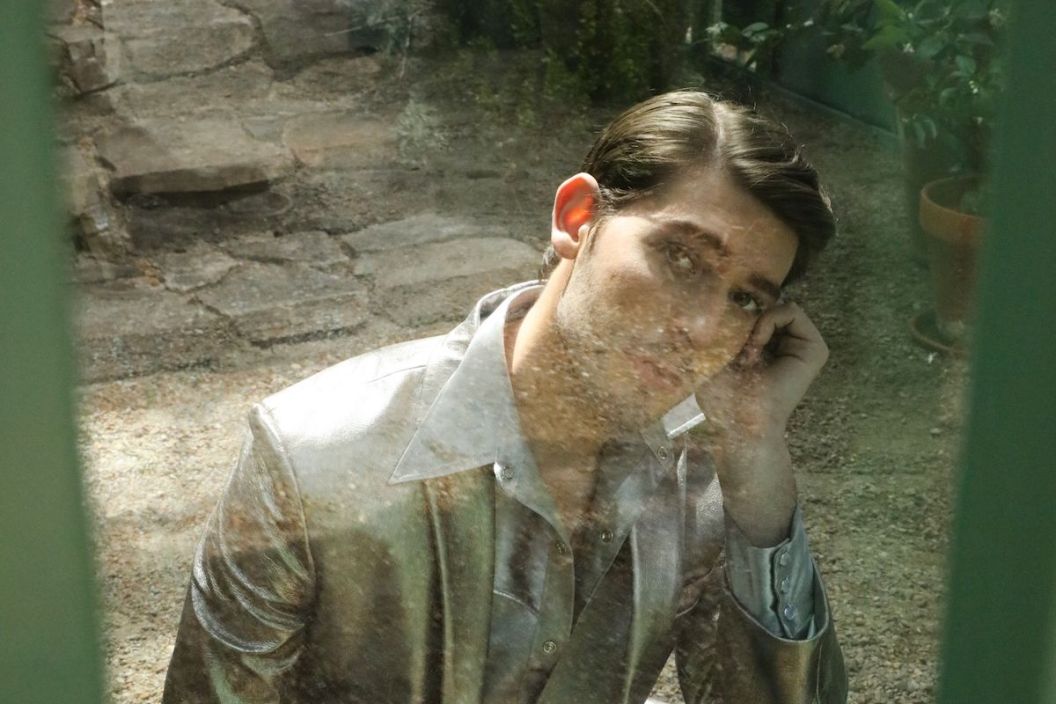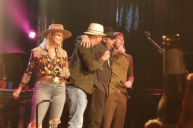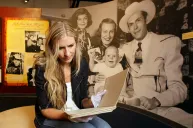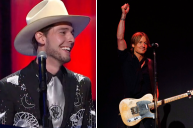On debut album Glasshouse Children (out Aug. 20 via Mercury Nashville/UMG Nashville), singer-songwriter Sam Williams inadvertently follows a path that worked wonders for his famous father. Like Hank Williams Jr. before him, Sam's realized that the best way to keep the family business rolling is to bring his own influences and voice to the table without losing sight of a surname that makes him instant country royalty.
Hank Jr. famously pivoted from the clean-cut, would-be successor to his dad to the rock 'n' roll and blues-influenced showman who'd dominate industry awards shows and the charts on his own terms. Not that he forgot his roots: the second version of ole Bocephus brought us "The Conversation," after all.
"I'm glad that I didn't put out a ton of music and then lean toward doing my own thing on my third or fourth album," Sam told Wide Open Country. "That's why it may not be everyone's cup of tea because they'd like me to sing 'Family Tradition' until I don't remember the words anymore. But I think that's what's really cool about it. What's been done has been done. It can be honored and tributed, but it doesn't need to be remade."
Much like Hank Jr. loved ZZ Top and Van Halen (as mentioned in his song ""Young Country"), Sam brings his own, current influences, from pop music to the contemporary country sound of one of the album's special guests, Keith Urban.
"A lot of it was really just what felt natural to me," Sam explained. "Definitely 'Hopeless Romanticism' and 'The World Alone' are impacted by artists that I listen to. I did want to have elements of pop music in the album, and I think that's always in the back of my mind. It's just kind of what I do."
Though no one in Sam's family pulled him aside at any point to champion doing his own thing as an artist, one of his half-sisters delivered an indirect message during his formative listening years.
"[Holly Williams'] album 'The Highway' came out in 2013 when I was in high school, and a lot of those songs really were formative for me, so that definitely impacted my songwriting and made me question what do I want to tell about my own story and what is my music going to be like," Sam added.
Urban plays guitar on "Kids," the only song on the semi-autobiographical album not co-written by Sam.
"Every songwriter has their thing, their go-to that kind of defines them. For me, it's the 'Happy All the Time,' 'Glasshouse Children' the track, 'Can't Fool Your Own Blood" that are really deep diving personally and pull at your heartstrings when you listen to them," Sam explained. "I still wanted there to be a balance of upbeat and hopeful songs with, you know, pop influence and stuff.
"When I heard 'Kids,' my manager had stopped sending me songs because I refused to cut any," he continued. "And when I heard 'Kids,' I was like, 'You know, I'd actually love to give this a shot.' It just felt really, really good and I loved the demo of it. I love how it turned out, and having Keith on it is just... Sometimes, we can be limiting because we want to feel solidified as a songwriter and validated. But you know, truth is, my grandfather didn't write 'Lovesick Blues,' and you know, sometimes it's good to take songs from other people."
Sam namedrops another one not written by his grandfather that's become synonymous with his family, Leon Payne's "Lost Highway," during "Can't Fool Your Own Blood," an introspective co-write with Jaimee Harris and one of the finest living songwriters, Mary Gauthier.
"It paints a picture for you, and even if you're not really familiar with my family lineage and legacy, I think you can get what it's saying," Sam says of the song. "It references trials and tribulations that have been plaguing to my family before and doing my best to keep my guard up and keep those things off of me. Sometimes it feels inevitable."
Another tie to the past comes when guest vocalist Dolly Parton adds a touch of cheer to "Happy All the Time."
"It is the coolest thing ever to me," Sam said of hearing Parton's voice on his debut album. "Something I think I really struggle with a lot is even though I write my own songs and I don't sound like other people in Nashville, I can easily feel fraudulent. Having her do this song with me and loving the message, loving my voice and all the amazing things she said to me, it's just the biggest forehead stamp that I want to get tattooed forever for everyone to see.
"It just feels so validating, and when I wrote her a letter trying to get this collaboration to happen, it's something I wrote in the letter. Like, you know, 'Miss Dolly, this would be so validating for me. I really think it would change my life and change my career'," he continued. "It's just amazing because I'm a huge fan of her worldview, her impact, her versatility, her reinvention. There's just no one like her, so I just feel really, really lucky."
The album wraps up the first chapter of Sam's personal journey from avoiding everything that comes with being a singing grandson of Hank Williams to basking in the footlights at the Grand Ole Opry House.
"I didn't like to talk about going into music when I was little," Sam said. "I was very, very, very studious, and I was going to be anything but that. But when you grow up, things change. My dad probably thought I was going to be a senator or something, and he's probably really glad that this happened."
Though he's not likely to ever abandon his pop and modern country influences, don't be surprised if the next chapter of Sam's story finds both "Can't Fool Your Own Blood" and "Lost Highway" on the same setlist.
"I think in the future, I'll definitely be recording some of my grandpa's songs, and there will definitely be a Sam Williams version," he added.




